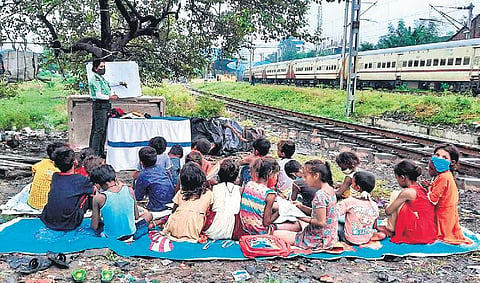Cops turn teachers for Kolkata slum children
WEST BENGAL: His sharp eyes never miss motorists jumping traffic signals or violating rulebooks. Nor did they miss the sight of a group of children sitting on a cycle van and reading textbooks along the railway tracks in Kolkata.
Pransenjit Chatterjee, the officer-in-charge of south-west traffic guard in Kolkata, was touched by the zeal of the children who came from a local shanty. Chatterjee knew what he would do for them. He requested his subordinates to arrange regular coaching class for the children trying to make sense of the books they were reading, along the rail tracks, near Majherhat railway station in the southern part of the city.
Their parents were too poor to afford books and smartphones as Covid-19 restrictions had made their condition even more pathetic. In came the traffic police personnel who would sit under the open sky and teach the children for two hours every day.
“It was August 11 and I was patrolling the area as usual. While passing through the shanty area, known as Madhu Bustee, I saw a group of boys sitting on a cycle van. Curiosity took me closer to them. I was surprised to see them trying to study on their own,” says Chatterjee.
The traffic police officer, who is known for carrying out welfare works, asked his staff to start a coaching class from that day. “We arranged a board and a marker pen to teach the children. We maintain physical distance in the coaching class. The tuition session has brought back smiles on the children’s faces. It is a precious gift to me,” he says.
With 30-odd students, the coaching class runs in two shifts for students up to Class IV. “As regular classes are closed for over a year, online classes have become a part of education, right from primary standard to higher education. But most of these children do not have a smartphone to enable them to attend online classes. Their family members are daily wagers whose income is badly hit by the pandemic. We have decided to continue the coaching till schools reopen,” says Chatterjee.
Biplab Mandal, son of a labourer, is happy with his new teachers – the men whom they feared most just a month ago. “They told us they would help us to study. That’s what we wanted – some help in our studies,” said the student of Class IV. The children are being taught Hindi, English and Math.
The parents are simply grateful to the men in uniform. “I work as a driver of a private bus. The pandemic has made us even poorer. I could not afford a smartphone for my daughter’s online classes. And I can’t even think of sending her for private tuition because I am struggling to earn,” says Gopal Shaw, a father of three.
Priyanka, a Class III student, was missing her classes. “I could not understand English. My father couldn’t help me. A policewoman is teaching me now. I want to go to school. In the coaching class, I feel like I am in school,” she says with a smile on her face.

